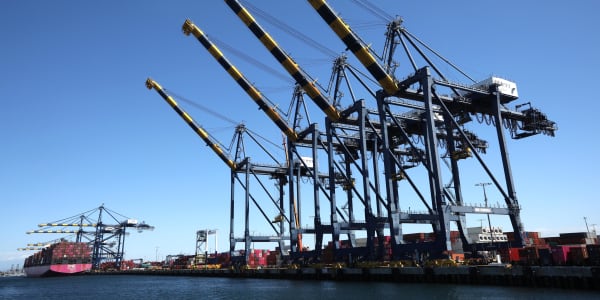
A perfect storm is taking place in the diesel market, with dwindling diesel reserves, a drought on the Mississippi River pushing more product to rail and truck, and a possible rail strike leading to a surge in prices that is expected to continue.
Diesel prices have increased by 33% for November deliveries.
"The national average price for diesel today is $5.30 per gallon and is expected to go up 15 to 20 cents in the next few weeks," said Andy Lipow, president of Lipow Oil Associates, LLC.
Reserves for diesel this time of year have not been this low since 1951, with the greatest shortfall in the Northeast region including New York and New England.
"This is not only constricting the ability of farmers to export the soybeans and grain they grow but also to receive the fuel and fertilizer they need to operate," said Mike Steenhoek executive director of the Soy Transportation Coalition of the low water conditions that have turned the Mississippi River from a multi-lane interstate to a two-lane highway.
"Now adding insult to injury is the increased uncertainty that railroads will be able to provide an effective lifeline during this critical time. It's a vivid reminder that it is not enough to produce a crop or have demand for that crop. Having a reliable supply chain that connects supply with demand is also essential for farmers to be successful," Steenhoek said.
Two rail unions recently voted down a labor deal needed to avert a national strike in the coming months.
East Coast refineries operating at max capacity
Diesel inventories in the New York/New England markets are facing an acute crisis, down over 50% since last year and at the lowest level since 1990, according to Lipow.
Lipow said East Coast refineries are making as much diesel as they can and dependent on tankers and barges for supply, any weather delay causes a terminal to run out of product..
According to the EIA, East Coast refineries operated at 100% capacity in June and July.
"Last week, they operated at 102% of capacity," Lipow said. "No more supply is forthcoming from the four East Coast refineries."

New England's diesel supply issues were made worse when a Canadian refinery in Newfoundland shut down in 2020 as the pandemic impacted on demand.
The Midwest is also seeing supply constraints, pushing up costs for farmers.
"In visiting with a number of farmers, the consensus, of course, is that diesel costs are one more incursion into profitability," Steenhoek said. "As far as getting supplies, it looks like those areas most dependent upon the river are experiencing the biggest challenge. A couple of farmers told me diesel supply via their local vendor is day to day."
Jones Act restrictions on foreign vessels
In order for the Northeast to receive more diesel, the fuel needs to be imported from another country or a tanker from the Gulf Coast, but that is not allowed because of the Jones Act, also known as the Merchant Marine Act of 1920, which prohibits a foreign vessel from transporting all goods between two U.S. ports.
"The Jones Act requires all cargo transported between U.S. ports be carried on ships that are U.S. flagged and built, and mostly owned and crewed by Americans," said Captain Adil Ashiq, United States Western region executive for MarineTraffic.
According to MarineTraffic, the 55 Jones Act tankers are being used. One way to add more supply quickly is for the Department of Homeland Security to temporarily waive the act for foreign vessels to move the fuel.
As a result of the small quantity of U.S.-owned and operated tankers available for energy transport, the price to book a Jones Act tanker is about double that of a foreign-flagged tanker. For example, a Jones Act tanker carrying 300,000 barrels of diesel from Houston to Boston costs approximately 16 cents per gallon. If the Jones Act was waived, a foreign flag tanker carrying the same amount of fuel and heading to the identical location is estimated to cost half, 8 cents per gallon. This 8-cent per gallon difference translates into a $1 million savings per tanker. This is one of the reasons why energy traders favor using foreign flag tankers versus Jones Act tankers.
DHS told CNBC in response to a request for comment about the Jones Act that it is vital to maintaining the strength of the American shipbuilding and maritime industries by requiring all maritime cargo transport between U.S. ports to occur on U.S. flagged vessels. "When U.S. flagged vessels are not available to meet national defense requirements, the Department of Homeland Security may grant a waiver to the Jones Act if the proposed shipments are in the interest of national defense and after careful evaluation of the issue," the DHS stated.
The DHS noted that in 2020, Congress eliminated the federal government's authority to issue long-term comprehensive waivers, except in circumstances where a waiver is required to "address an immediate adverse effect on military operations. Under the law, waivers that do not meet that standard must be reviewed on a case-by-case basis."
The Jones Act was last waived for a tanker filled with diesel from the Gulf to go to hurricane-stricken Puerto Rico where the energy was needed for power generators.
"If the [Biden] administration wants to replenish New England gasoline or distillate inventories at the expense of exports, they need to waive the Jones Act for refined products loading on the Gulf Coast for delivery to New York, New Jersey, and New England," Lipow said. "Unfortunately, I don't think they will do it until it is too late."
Traders profit, Russia ban looms
Traders are diverting tankers away from Europe to the U.S. because the price of U.S. diesel is now higher than in Europe so they can make a larger profit. So far, two tankers have arrived and unloaded.
According to MarineTraffic, the tanker Thundercat was originally destined for the Netherlands after being loaded in the Middle East with about 650,000 barrels (the equivalent of 27 million gallons) of diesel. It went to New York. Another tanker, Proteus Jessica, loaded in the Singapore area with a similar diesel supply also headed to New York.
For regions including New England, competition with Europe for diesel supplies will intensify next year when an EU ban on Russian refined product purchases is implemented, Lipow said. Diesel exports are of particular interest with the date of February 5, 2023, when the EU sanctions on Russian refined oil products begin, said BIMCO's chief shipping analyst Niels Rasmussen, adding that 90% of the EU's import volumes are diesel.
"The EU must replace on average 2 million tons of diesel imports from Russia," Rasmussen said. "In addition, the International Energy Agency has estimated that the EU's demand for refined products will increase by 300,000-500,000 barrels per day during winter to meet heating demands."
Correction: This story has been updated to reflect that the correct number of active Jones Act vessels is 55 and to include a comment from the Department of Homeland Security on the Jones Act waiver process.





